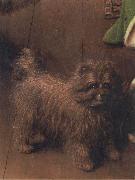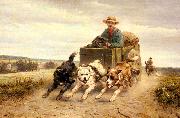Wholesale Oil Painting No Minimum |
|||||||||||
|
|
|||||||||||

|
|||||||||||
|
|
|
||||||||
Jan Van Eyck1395-1441 Flemish Jan Van Eyck Locations Painter and illuminator, brother of Hubert van Eyck. According to a 16th-century Ghent tradition, represented by van Vaernewijck and Lucas d Heere, Jan trained with his brother Hubert. Pietro Summonte assertion (1524) that he began work as an illuminator is supported by the fine technique and small scale of most of Jan works, by manuscript precedents for certain of his motifs, and by his payment in 1439 for initials in a book (untraced) for Philip the Good, Duke of Burgundy. Jan is first documented in The Hague in August 1422 as an established artist with an assistant and the title of Master, working for John III, Count of Holland (John of Bavaria; reg 1419-25), who evidently discovered the artist while he was bishop (1389-1417) of the principality of Liege. Jan became the court official painter and was paid, with a second assistant when the work increased in 1423, continuously, probably until the count death in January 1425. |
||||||||
|
|
||||||||
The Dog
The Dog Painting ID:: 37824 |
mk129
a symbol of devotion since time im-memorial,
Stands for conjugal fidelity.
mk129 a symbol of devotion since time im-memorial, Stands for conjugal fidelity. |
|||||||
|
|
||||||||
Henriette Ronner-Knipwas a Dutch painter. Born Henriëtte Knip in Amsterdam, she moved at a young age to Den Bosch and was until 1850 active in Sint-Michielsgestel and Boxtel. That year she married Feico Ronner and moved to Belgium, first to Brussels and in 1878 to Elsene. She studied with her father, Joseph August Knip. She was best known for her paintings of subjects from nature, especially cats and dogs. |
||||||||
|
|
||||||||
|
|
The Dog
The Dog Painting ID:: 67098 |
The Dog Cart by Henriette Ronner-Knip (1821-1909)
oil on canvas, 101.6 x 147.3 cm (40 x 57 7/8 inches) The Dog Cart by Henriette Ronner-Knip (1821-1909) oil on canvas, 101.6 x 147.3 cm (40 x 57 7/8 inches) |
||||||
|
|
||||||||
|
Henriette Ronner-Knip was a Dutch painter. Born Henriëtte Knip in Amsterdam, she moved at a young age to Den Bosch and was until 1850 active in Sint-Michielsgestel and Boxtel. That year she married Feico Ronner and moved to Belgium, first to Brussels and in 1878 to Elsene. She studied with her father, Joseph August Knip. She was best known for her paintings of subjects from nature, especially cats and dogs. The Dog The Dog Cart by Henriette Ronner-Knip (1821-1909) oil on canvas, 101.6 x 147.3 cm (40 x 57 7/8 inches) |
||||||||
|
|
||||||||
|
Prev Next
|
||||||||
|
|
||||||||
|
Related Paintings to Henriette Ronner-Knip :. |
||||||||
|
|
||||||||
|
CONTACT US |


